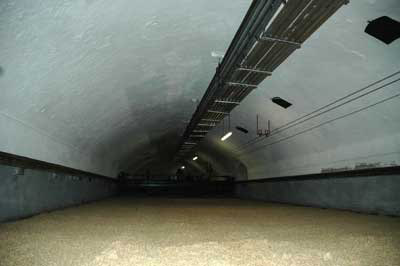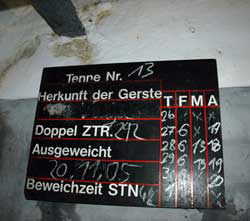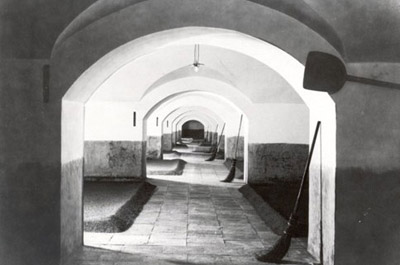In a weak moment while responding to Lew Bryson’s comment in the X Beer discussion I seem to have promised to write something nice about helles.
Not tough duty. I warmed to the task by drinking a glass of Class VI Golden Lager from Chama River Brewing in Albuquerque. It’s almost always the first beer I order when we’re at Chama. I usually forget and just ask for a “helles,” then explain I want the Class VI when I get a blank look from the server.
The aroma is fresh and bready, just what you expect from German pilsner malt. The flavor is rich but not distracting and the finish spicy and dry. It’s a beer that doesn’t get in the way of conversation; with an added benefit of being less than 5% abv.

I don’t usually spend much time thinking about beer when drinking this beer, since there are matters of conversation and ordering food. But if I do it’s not hard to imagine myself standing in the malting halls at the Augustiner brewery in Munich, two flights below the brewery yard. The air is damp and smells thick, like a field of grain after a solid rain.
At the other end of the hall a machine churns to life – chug-a-chug, chug-a-chug, beating out a rhythm, squeaking from time to time as it advances toward me. It is gently turning the malt, which is spread a shallow 12-15 centimeters high.
 (Given that eyes adjust better to dark conditions that my camera, the photos here don’t quite portray what I saw. The top one shows the hall, the one to the right the machine from a long ways away with the light “turned up,” the next a chalkboard that tracks the status of a batch of malt. The image at the bottom shows that Augustiner has left some tradition behind – picturing when malt was turned by hand.)
(Given that eyes adjust better to dark conditions that my camera, the photos here don’t quite portray what I saw. The top one shows the hall, the one to the right the machine from a long ways away with the light “turned up,” the next a chalkboard that tracks the status of a batch of malt. The image at the bottom shows that Augustiner has left some tradition behind – picturing when malt was turned by hand.)
 Augustiner is the last brewery in Germany with its own malting facility, and its floor-malting is one of only two left in the country. Augustiner bills itself as the “keeper of the tradition” but this is about more than tradition. Most agree that floor malting produces superior malt. By maintaining its own maltings Augustiner also has the option to pick from different barleys, sometimes using older varieties of that malt suppliers no longer offer.
Augustiner is the last brewery in Germany with its own malting facility, and its floor-malting is one of only two left in the country. Augustiner bills itself as the “keeper of the tradition” but this is about more than tradition. Most agree that floor malting produces superior malt. By maintaining its own maltings Augustiner also has the option to pick from different barleys, sometimes using older varieties of that malt suppliers no longer offer.
Augustiner also controls the degree to which the malt is modified. Its brewers prefer it less modified because they conduct a decoction mash for each of their beers, a practice pretty much abandoned by the other Munich breweries.
Which brings us to Lagerbier Hell, a delightful expression of pilsner malt and Hallertau hops wrapped in a 5.2% abv package. Another fresh and bready beer, with a satisfying hop quality. Does decoction make a difference? That’s another discussion – many brewing scientists will argue not in a way that can be measured; others maybe agree, then say they can still taste difference.
For whatever the reason, Lagerbier Hell has an extra layer of flavor. You notice it when you first taste it and you might again if you revisit the beer in a thoughtful way. Otherwise it becomes willing background to conversation – perhaps at one of the long communal wooden tables in the restaurant on the brewery grounds.

Hell yeah Stan! Preach the goods on the yellow fizzy stuff that actually makes a beer geek swoon. Well…the ones that live & learn after years of suckling on nothing but high ABV and 100+ IBU “Top 100″‘s.
Cheers!
sitting here drinking an augustiner helles bier right now. the finest of the finest. through a friend of a friend, a tour of the brewery is being organised – something that isnt usually allowed. what makes it all the more exciting is that we live about 100 meters from the brewery. good to know that others appreciate the german gold.